When deep-well bore water arrived in Australian bush communities people thought the big thirst was over. Jeff McMullen reports that a decade long study shows unsafe water is now cutting lives short. This story was first published by newmatilda.com. Jeff McMullen has permitted me, Diet Simon, to post it here.
If a baby is fed unsafe water contaminated with chemical nitrates, the child turns blue. The striking colouring occurs particularly around the eyes and mouth. Blue Baby Syndrome is the decrease of the oxygen carrying capacity of the haemoglobin. It is potentially fatal. And yet, in scores of communities across Australia many people are still not aware of the growing evidence that nitrates – found naturally in the environment and compounded by mining – are a crucial factor in a devastating epidemic of chronic illness, particularly renal problems afflicting children and adults.
“I never dreamed that our water has such high levels of nitrate contamination,” says Dr Christine Jeffries-Stokes, paediatrician to the Goldfields region in Western Australia.
“Water flows from the Pilbara all the way south to the Great Australian Bight. The critical threat is the nitrates, combined with uranium and arsenic, to create a perfect storm.”
It is this discovery – that not only is there an immediate threat of nitrate poisoning from high levels in the water but also a long-term danger caused by prolonged exposure – that will bring Dr Jeffries-Stokes and her medical team from the Western Desert Kidney Project face to face with the WA Government this week, to present their findings and lobby the government to finally take action.
Co-Chief Investigator of the decade long research project, Annette Stokes says “people are very, very sick”.
“Some already had diabetes and did not know it. Others are progressing to end state renal illness without ever being aware of this water poison.”
“Previously unexplained levels of chronic illness, especially kidney disease afflicting black and white people in remote regions, can now be understood,” adds Dr Jeffries-Stokes.
“Governments must take action urgently and it is no good talking about closing hundreds of remote communities and towns. This affects so many people Governments must clean up the water.”
One of Australia’s most respected epidemiologists, Professor Fiona Stanley, has added her voice to the call for urgent action.
“This is a really important public health and human rights issue, particularly for the Aboriginal populations of the eastern Goldfields. The neglect that we have shown these populations over the years is being added to by our reluctance to clean up the water supply,” Professor Stanley says.
“It is a deliberate neglect,” says Pastor Geoffrey Stokes, husband of Dr Jeffries-Stokes and a Wongatha Wonganarra elder.
“It brings back memories of the mining magnate, Lang Hancock, saying someone should dope our water to make us sterile and that would take care of the Aboriginal problem.”
Geoffrey Stokes glowers with anger at mining companies that encroach on Aboriginal lands and, he claims, contribute to the pollution of water supplies in many parts of the country through increased levels of nitrates and uranium.
Earlier this month he was convicted of discharging a shotgun in the air outside the Lady Liddington Mine, 700 kilometres northeast of Perth. He was allowed to keep his gun and the conviction was erased from the records when it appeared the Goldfields magistrate, John O’Sullivan, saw the Pastor as a usually peaceful man.
Dr Christine Jeffries-Stokes directs her wrath today more at the Western Australian governments who for 10 years have knowingly granted “exemptions” to allow many towns and remote communities to use bore water where it was known that they had a high risk or unsafe levels of nitrates.
Australian Drinking Water Guidelines specify a “safe” level for infants under three months of age as 50mg/litre (measured as nitrate) and 100 mg/L for adults and children older than three. On the basis that no other water supply was readily available, the WA Government exempted from the water regulations some towns and communities in both the Pilbara and Goldfields regions.
These include the larger towns of Laverton and Leonora, as well as Menzies, Cue, Meekatharra, Mt. Magnet, Nabawa, New Norcia, Sandstone and Yalgoo.
“Why do they grant exemptions that may allow harm to happen?” says Dr Jeffries-Stokes, “The previous WA Government headed by Premier Colin Barnett wouldn’t really say. But there were mutterings that solutions would cost too much money. This simply isn’t true.”
Tomorrow, Dr Jeffries-Stokes and medical colleagues are scheduled to meet with WA Deputy Premier and Minister for Health, Roger Cook, to present the findings of a decade long investigation that has vital relevance to many parts of Australia and other nations around the globe. The United States, most Central American nations and Sri Lanka have all detected the same striking discrepancies in renal illness patterns, posing until now one of the most challenging medical mysteries.
“What we have learned is that this epidemic hits black and white, rich and poor and that policemen, health workers and school teachers in remote communities are just as susceptible as the most disadvantaged Indigenous people,” says Dr Jeffries-Stokes. “The central factor in a multifactorial puzzle is what is in their drinking water?”
The Western Desert Kidney Health Project, led by Dr Jeffries-Stokes and her sister-in-law, Annette Stokes, began in Kalgoorlie in 2010. The medical team drive a six-tonne mobile clinic across an area the size of Victoria, detecting and trying to manage chronic illness in 10 communities ranging from whole towns to smaller Aboriginal communities.
For this outstanding health work, the team was awarded the 2015 award for excellence in research from the Royal Australasian College of Physicians. In 2017 Dr Jeffries-Stokes may well see her PHD on nitrates in drinking water making medical headlines around the world.
“What we have found in WA is a pattern disturbingly similar in many ways to that in Sri Lanka, where people on one side of the road using unsafe bore water have dangerous levels of life-threatening kidney disease, but another nearby community accessing spring water has far better wellbeing on all fronts.”
“When we investigated the nitrate levels with years of study here in the desert we found a correlation with the sickest communities.”
As early as May 2015 an Auditor General’s report of 271 communities in Western Australia found that some had nitrate levels more than 10 times the guideline value. At least fourteen communities had levels above 50mg/L, enough to cause Blue Baby Syndrome.
Significantly the Auditor General’s report confirmed that at least four of the communities had unsafe levels of uranium in their water supplies.
“When we studied the combined impacts of these chemicals and heavy metals the truth dawned, “says Dr Jeffries-Stokes.
“The nitrates make uranium, arsenic and other heavy metals more soluble. Uranium in the presence of nitrates creates the substance, uranyl nitrite, which is extremely toxic to kidneys.”
“In addition, we tested three children from Laverton and one from Mt Margaret that had positive levels of arsenic. That shows up as a numbing of their bare feet.”
As a second mobile truck staffed by health workers and artists engages the communities in the Western Desert Kidney Health Project, they encourage people to improve their nutrition, stop smoking, reduce alcohol consumption, exercise more and always beware of the unsafe bore water.
“Unquestionably, the epidemic of kidney disease and other chronic illness has multiple factors, “says Dr Jeffries-Stokes.” But if water is poisoned then nothing will help on the other issues.”
After devoting most of her professional life to improving the wellbeing of Australians, Professor Stanley says, “I do feel quite anguished that so many people just don’t care about these significant populations of people in the goldfields.
“The Western Desert Kidney Project is doing amazing research and adding comprehensive health management but for them not to be able to provide good, clean, fresh water is going back to the 17th century, when water was not good for you.”
Multidisciplinary health experts are aware that the threat of poisoned water is not confined to WA.
“In the Northern Territory they have high contamination rates around 50mg/L at Tennant Creek, Mutitjulu near Uluru, and even the resort of Yalara has had high levels of nitrate in bore water,” says Dr Jeffries-Stokes. “Anyone in Australia using bore water should have it carefully tested to check for levels of nitrates and heavy metals.”
This research breakthrough in Western Australia has been hailed by other leaders in the field of public health.
Professor Wendy Hoy, Director of the Centre for Clinical Research, University of Queensland and one of Australia’s leading kidney health researchers says the research may prove to be ground-breaking.
“I suspect we have overlooked the major role of nitrate contaminants, particularly in mining regions where we see the combination of uranium and nitrates. It is very likely that this is a major exacerbating factor in the epidemic of kidney disease,” Prof Hoy said.
“This is a global problem and I am particularly aware of similar illness patterns in some farm belt areas of the United States, in Central America and particularly in Sri Lanka.
“After becoming aware of the nitrate risk and acting on the precautionary principle, Sri Lanka’s Government has gone way ahead of Australia’s, not only in monitoring the levels of the nitrate threat in affected communities but rapidly introducing the water treatment technologies than can safely remove pollutants including nitrates, uranium and arsenic.”
Who will act?
Western Australia’s previous Government led by Colin Barnett was notoriously bent on closing an undetermined number of the state’s remote Aboriginal communities.
Earning even greater infamy, Prime Minister Tony Abbott declared in March 2015, “what we can’t do is endlessly subsidize lifestyle choices.” Abbott not only drew scorn from Aboriginal people around the nation for yet another thoughtless jibe, he abandoned the remote communities in WA, leaving them entirely at the mercy of a state government protesting bitterly about funding shortfalls as the lustre of the mining boom disappeared.
The humiliating fall from political grace by Abbott and Barnett may be a poisoned chalice.
Will Malcolm Turnbull’s shaky Coalition or a Labor Federal Government led by Bill Shorten reinstate the appropriate levels of federal health and infrastructure spending to ensure that all Australians enjoy the fundamental human right of clean water?
Will the current WA Labor Government clean up the water for all of its citizens?
These are not questions that can wait because the lives of many people depend on the answer.
At the moment, bottled water is delivered to some remote communities in WA for use in feeding infants under three months of age. It sells out quickly. What happens next may be dangerous for babies because Dr Jeffries-Stokes warns that merely boiling bore water can exacerbate the toxic mixing of the nitrates and uranium often present.
In addition to these threats, the 2015 Auditor General’s review of service delivery in 271 WA remote communities reported that 76 of them had E.coli or Naegleria microbe contamination, both of which can cause sickness or death.
The scale of the health threat across Western Australia and perhaps beyond makes it impossible to explain why Federal, State and Territory Governments have been slow to call in the available high-level medical and technological expertise to address the dangers.
“We have a large network of knowledgeable people, medical and science experts, that can be enlisted to draft a unified national response,” says Prof Hoy.
Victorian chemical engineer, Phil Krasnostein of Optimos Solutions, scoffs at suggestions by politicians that WA or any other state cannot afford effective water treatment.
“Ultimately, it is about Australia’s water security,” he says. “It costs about $70,000 a year to provide dialysis for a single kidney patient. If we don’t head off the chronic illness plague, particularly in rural areas, the long-term costs will be unmanageable.”
Krasnostein also finds it hard to fathom why only one or two WA remote communities have seen the arrival of water treatment facilities capable of eliminating the elevated levels of nitrates, uranium and arsenic.
“Larger towns may require reverse osmosis units but they must be managed by skilled people to be effective,” he says. “In a small remote community you can introduce ‘throw away’ cartridges that are easily fitted under the sink bench top.
“The bottom line is that water contamination should not be accepted anywhere in the country. People are entitled to safe water wherever they live.
“I am certain that a management system planned and led by medical professionals can put in place the right water cleansing technologies in all Australian communities.”
While poisoned water weighs heavily on the minds of everyone at the Western Desert Kidney Project, the on-going political poison of threatened closure of many of the smaller communities keeps surfacing.
“We have very grave fears that the government will try to close our communities,” says Annette Stokes. “They will try anything.”
“We have spent all of these years working on the answers, working with people in the communities who want their children to have healthier lives, “adds Dr Christine Jeffries-Stokes. “It would be a tragic mistake if they tried to shut down communities when clearly the answer is to clean up the water.”
To drive Aboriginal people off country, to close communities and clear the way for more mining or to leave people in these communities with poisoned water, Pastor Geoffrey Stokes knows that any of these dreaded options would have Lang Hancock smiling.
Jeffrey John "Jeff" McMullen AM, is an Australian journalist.[1][2] He was a foreign correspondent for the Australian Broadcasting Corporation for almost two decades (1966–1984), international reporter for the investigative television program Four Corners and later joined the Australian version of 60 Minutes (1984–2000).

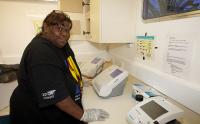
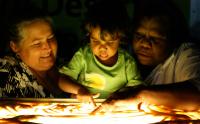
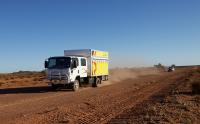
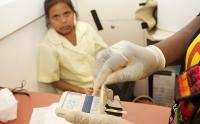
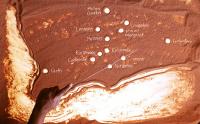
Recently here on linksunten
The week that has been in climate and nuclear news - UN committee urges Australia to rethink support for Adani coal mine - What Happens When You Tell Somebody Else’s Story? - Reviewing 10 years of government oppression of Aborigines – the pain continues - “Five attempts on my life, character assassination, to push government agendas” - “Proposed Australian law would lock our society into two classes of people” - “Assimilation into the constitution would seal the theft of our lands, waters and natural resources” - Cave sacred to Aboriginal women faces destruction for massive housing project - How South Australians dumped a nuclear dump - The Intervention: Ten years of Australia’s shame - public forum - Australian Senate has just sold out indigenous land rights to help Adani - Australian Senate to vote on weakening indigenous people’s land rights forever - Strong spirit, strong culture, strong people - Open Letter to the Northern Territory government by Aboriginal lawmaker - Perfecting trickery: Australia's Referendum Council - The Uluru walkout: Constitutional recognition, Treaty and structural change - 'Unfinished business' of stolen generations puts more children at risk – report - Benefits of new union of 23 New South Wales and Queensland First Nations - 'The amnesty on ignorance of Australia’s frontier wars is over' - 550 places named in 2016 where Aborigines were massacred, in the 2017 march the number had risen to more than 1,000 - 'The amnesty on ignorance of Australia’s frontier wars is over' - Wrong legal advice from two professors on Indigenous referendum outcomes - Always independent: An interview with Murrawarri Republic Chair Fred Hooper - Prime Minister Turnbull offers to sacrifice Aboriginal rights to Adani in an act of national betrayal - Australian governments have failed Indigenous peoples, says Oxfam - Thousands protest in Australia against Reef-destroying monster coalmines - The enemy within! Beware of the programmed de-Aboriginalised Aborigines! - United Nations rapporteur 'appalled' at Indigenous youth detention and living conditions in Australia - Australian government fails to pass native land rights changes - major setback for proposed giant Adani coal mine - “I can't describe the feeling of having to prove my Aboriginality” - “Eat that little bit of poo go! go! go! Come suck my dick you little cunt” - “9,000+ anti-Adani campaigners to occupy work sites, chain themselves to machinery and clog phone lines” - Adani hopes to start mining in Queensland in August, state Premier confident - Ten years of Close the Gap; Why are we sicker, poorer and living shorter than the rest of Australia? - "Miners and other rich developers will have even better tools to divide and conquer us" - The Australian government's constitutional ‘Dialogue’ processes are fatally flawed - Urgent: Last chance to stand up for indigenous land rights! - Protest against new uranium mine in Western Australia - A treaty won't solve everything, but it could change this nation's cultural tapestry - Literaturstar aus dem Wohnwagen - First Nations form green energy alliance to beat govt. electricity corruption - "One of the vilest racist acts we've seen"